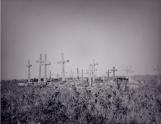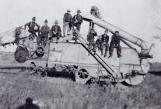1
Maria Tsiurka, who immigrated to Canada in 1910, tells the story of her way to Canada and her first years in a new country.3
I was born in 1892 in the village of Rozhirche, Stryi Region, in Lviv Province. My parents' names were Ivan Yartym and Dosia Semenov. They were poor peasants. Our family was large: my parents, five sons and four daughters.Ours was a poor village. There were three top figures in the village: the land owner Baransky, the tavern keeper Herschel and the priest Heheychuk. Even though feudalism had been formally abolished, the peasants nevertheless had to work as hard and suffer, as much as they did during the times of serfdom.
Here is an example of the way the priest Heheychuk exploited the peasants: he charged sixty rynskys to perform a marriage; on top of that the groom had to put in three days work with horses and, if he owned no horses, he had to work a whole week on the priest's property. When the couple went to receive their marriage counselling, the groom had to bring a chicken (two if they were small) and the bride had to bring a dozen eggs. Added to that, the bride had to work five days in his field or in his yard, because he kept many pigs and cows.
In order to improve his unenviable situation, my father decided to become a vegetable grower. He bought some gardens in the village of Stynaw, sold the produce and so improved his condition. It was a good year and he made enough money to buy some more gardens. He sold the produce in Stryi and Skole.
Having acquired these material means, he sent the eldest son to secondary school. He wanted his children to get an education, since he had no other inheritance to give them. Later, he also sent my brother Michael to secondary school. My two other brothers, Ilko and Oleksa, went to Germany. The fifth son, Petro, died at home after undergoing an operation on his throat.
At that time the talk in the village was about Canada and little else. People saw the photographs displayed by the travel agent: tables in dining rooms that bent under the weight of all sorts of food and drink.
I pleaded with my parents to let me go to Canada because it must be very good over there. Month followed month and at last it was my turn to go overseas. I was the sixth child in the family to leave parents, home and native village.
My passage was paid as far as Winnipeg. My father borrowed another $150.00 for three years and, as collateral, he signed away a piece of his property. He instructed me: "Be careful in everything. If you find things difficult, come back home; if you fare well, send us some money so that the piece of land that I signed away as security won't be lost."
This was in June of 1910. My father hitched up the horses and we set out. My mother was crying - after all, I was setting out on such a long journey all by myself. I was travelling alone because my father stayed behind to bargain with the priest over my birth certificate. The priest was asking for an extra ten rynskys for adding another year to my age. Otherwise, I wouldn't have been able to go overseas. During the time that my father was bargaining with the priest, some twenty-three other people had left for Canada. I had remained behind.
We crossed the river Stryi. I turned and looked back: I wanted to see my native village for the last time! It was Sunday. The girls were wearing embroidered blouses. People were on their way to church. The orchards were in bloom and the whole village was covered in greenery. My heart ached and I felt very sad.
The signal for the departure of the train sounded. My father kissed me on the forehead as he began to lament: "My dear children, why are you abandoning us? There won't even be anyone to give us a drink of water when we are old..." My mother wasn't crying anymore. She only whispered as she entreated me not to forget to write home. I watched their wrinkled faces and wasn't able to say a word. I kissed their hands and quickly got on the train.
When I arrived in Germany, I along with the other people had to wait three days for the ship. We were served bad food. On the day that we were eating our last dinner (fish soup), people began to complain and someone threw a bowl at the glass partition between the dining-room and the kitchen. After that, much glass was shattered, the people were throwing their plates against the wall and the waiters and cooks ran away. The gendarmes appeared and a fight ensued which lasted several hours, until the ship arrived.
We travelled eighteen days before arriving in Montreal. When we got into the train and began moving westward through the forest, from the coach window we saw unkempt Indian children that were standing looking at us. I was overcome with apprehension; is this where I am going to live? I glanced at the other passengers and saw that they were as sad as I. Perhaps we were all thinking the same thoughts about our future life in Canada.
At last we arrived in Winnipeg at the Canadian Pacific Railway Station. I saw many people embracing and kissing one another. Only I was greeted by no one. I knew no one there.
An elderly one-armed man walked up to me (Kyrylo Genyk?) and asked me many questions as to whom I had come to see and where I expected to live. I replied that my married sister was supposed to meet me, but for some reason she wasn't here. He invited me to go with him, saying that he would provide me with a room until such time as someone came for me. I believed him because he gave me three coupons with which to get my breakfast, dinner and supper.
My sister hadn't come to Winnipeg for me because she had heard that I wouldn't be able to come to Canada because I was still a minor. She didn't know that I was allowed to leave for Canada only after my father had bribed the priest to falsify my birth certificate.
This one-armed official found work for me in a biscuit factory. I was paid $5.90 a week for my work. I immediately began to look for friends because it was sad living in a foreign country without friends, not knowing either the language or the customs. After a short time I joined a church choir on the corner of Stella and McGregor Streets.
Sales agents in Winnipeg were urging people to buy lots in Transcona because, they said, it would soon be built up into the city. I went several times to see these lots because I didn't want to be left without money among strange people.
I wanted to write to my parents and apologize for not being able to repay them their money, but I wasn't able to find the words because it is unforgivable not to keep one's word to one's parents. On the advice of some kind people, I bought three lots on Howard Avenue with the money that my father had given me. My heart was filled with joy that at last I had some land. I kept on working and attended choir practice every Saturday. On Sundays, the choir sang under the direction of Peter Ruta, accompanied by the violinist Peter Yundak, while I, in my thoughts, was searching for a builder who would construct a house on the land that I had bought.
After some time, I met a young man who came from a place only a mile away from our village. He was Michael Tsiurka and he agreed to build a house for me. He ordered the building materials and, in 1913, there was a fine six-roomed house on one of my lots.
I married Michael Tsiurka in 1914. He was working in the Canadian National Railway round house in Transcona. When he received his first pay, he at once bought twenty fruit trees and planted them on the empty lots. He grew a fine orchard and the fruit produced in it won him first and second prizes at exhibition-fairs.
We lived in that house for twenty-six years. I should add that, during all that time, we had neither electricity nor running water. I had to carry water from the city pump which was a block and a half away.
Michael Tsiurka joined the Ukrainian Social Democratic Party in 1912. He was one of the founders of the Ukrainian progressive movement in Transcona. He was active in the trade union, Brotherhood Carmen Lodge 500. He was a member of the Ukrainian Labour-Farmer Temple Association, the Workers' Benevolent Association and, later, the Association of United Ukrainian Canadians. He subscribed to progressive Ukrainian papers.
We brought up four children and sent all of them to Ukrainian school. They also took up music and dancing.
I joined the Women's Section of the Ukrainian Labour Temple Association in 1923. I have belonged to the progressive Ukrainian organization all this time. I assumed various responsibilities in the Women's Branch of the organization: I was chairperson, secretary, distributor of our newspaper. I never refused any kind of work in the organization.
I am already eighty years of age. I joined the Senior Citizens Club in Winnipeg where I take part in discussions and in various activities.
MARIA TSIURKA
TRANSCONA, MANITOBA
interview by Peter Krawchuk
4
Ukrainian cemetery with wooden crosses1908
North West of Rossburn, Manitoba, Canada
 Credits:
Credits:Manitoba Archives
